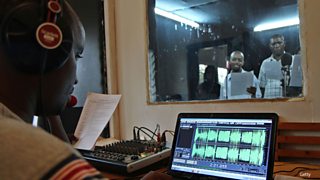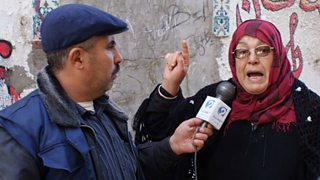The potential of reforming state broadcasters in divided societies: advancing an unfashionable argument
James Deane
Director, Policy and Learning
Tagged with:
ΒιΆΉΤΌΕΔ Media Action's Director of Policy and Learning argues for an urgent rethinking of what is often considered a relic of the past - the state broadcaster - to encourage discussion, dialogue and understanding across communities in fragile states.

Most commentaries on 21st-century media focus on the impact of new technologies, social media and, above all, the increasing global ubiquity of mobile telephony Such commentaries highlight how in many, if not most, societies, the majority of people are under the age of 30 and are reinventing how humanity communicates with itself. The focus is on innovation, on digital replacing analogue, on an old order of mass, vertical forms of communication being supplanted by horizontal, digitally enabled networks.
Speaking personally, I have advanced at one time or another all these tenets and continue (mostly) to do so. This blog, however, marks the publication of a set of ΒιΆΉΤΌΕΔ Media Action policy and research outputs I’ve commissioned which collectively advance some unfashionable arguments.
We focus particularly on the role of media in fragile and divided societies and especially on what can be done to support media that transcends, rather than exacerbates, divisions in society. We argue that, for all the innovation, dynamism and potential that exists, there are growing signs that publics are less and less trusting of the media that is available to them. Media environments appear more dynamic, interactive and complex, but much of media – both traditional and social – exists to advance particular agendas or interests in society rather than to serve a public. 21st-century fragmentation of media environments has often been accompanied by an associated fracturing of media often owned, controlled or heavily influenced by particular political, factional, ethnic or religious interests. Such fracturing often applies to both social and traditional media.
National debate
As one response, we revisit the potential in fragile and divided states of a set of institutions understandably considered relics of a monolithic, analogue, ageing past – the state broadcaster. We suggest that traditional state broadcasters – which we describe as often “too biased to trust but too big to ignore” – could provide a critical platform for national public debate in divided societies. For that to happen, they would need to transform themselves into genuinely independent 21st-century public service media organisations capable of being digitally agile, trusted and appealing to all in society (especially the young). Such a process we acknowledge presents formidable political, as well as technical difficulties. Despite the scale of the challenge, however, we argue that such a function is becoming increasingly important and increasingly urgent.
None of this is designed to justify reigning in or discouraging other forms of commercial, community, online or other media. Such media produce pluralistic, vibrant, often muscular debate providing the essential threads making up the fabric of healthy democratic societies. We believe that freedom of expression is as important now as it has ever been and we are actively opposed to attempts to control or censor.
But sometimes, especially in fragile and divided societies, our analysis suggests 21st-century media systems can foster greater division in society, making it more difficult for people from different faiths, ethnicities or politics to get on with each and get on with their lives. Greater attention needs to be paid to media that encourages discussion, dialogue and understanding across communities in divided societies, not just within them.
New analysis
We have already published several briefings that have examined these issues. drew on more detailed analyses from , , , and to track the often extraordinary economic and political contributions of media but also the growing fragmentation and co-option of both traditional and social media by factional interests. It flagged an increasingly urgent concern that some media was driving division, political polarisation and sometimes hate and that international support strategies appeared not to be reacting to these concerns. It also highlighted the many positive roles of media in the 21st century.

We published , a research report based on the kind of detailed, quantitative data that has only rarely recently been conducted in post -Arab uprising countries. It demonstrated a clear reduction in trust in a media that publics had become increasingly convinced existed to tell them what to do and think for the benefits of their owners or backers, rather than one that sought to inform and enable them to navigate the extraordinary turbulent sea of political transition.
We have just published two policy briefings examining the prospects of supporting media systems that are trusted, universal (reaching all parts of a society and reflecting the concerns of all sections of society), balanced and fundamentally focused on serving a public, rather than any other political, economic or factional interest.
The first is , by the former Director of News at the ΒιΆΉΤΌΕΔ World Service, Phil Harding. Some of the many people interviewed for the report argued that the concept should be consigned to an analogue dustbin of history. Phil argues that, while the concept needs to be entirely modernised, the role of an independent, trusted, national, universally available media entity whose sole focus is to serve its audience and work in the public, rather than governmental or factional interest, could not be more relevant.
The second briefing is . written by Alexandra Buccianti and Sarah El Richani. The briefing examines the relationship between media developments and the complex politics and social dynamics in four countries: Egypt, Lebanon, Libya and Tunisia. It concludes that the still mostly unreformed state broadcasters are working in the interests of their governments, rather than their people but if they can be reformed to become genuinely independent of government, they could provide a critical source of both social cohesion and political freedom.
Related links
Follow and ΒιΆΉΤΌΕΔ Media Action on and
